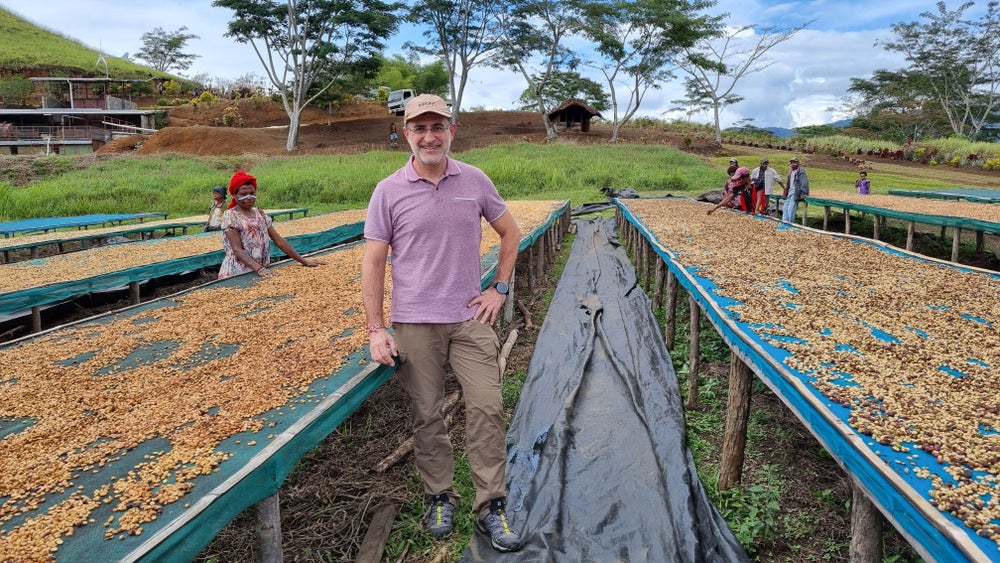From the Field, News
Monday, September 4, 2023
Investing in Regenerative Agriculture
Leon Sanchez Blanco is Sucafina’s Global Agronomy Manager. We interviewed him about his role, Sucafina’s agronomy priorities, and the projects he is working on.

This interview first appeared in our 2022 CSR report. See the full report.
Please introduce yourself and tell us about your background.
Leon Sanchez Blanco: I’m a Spanish agricultural engineer, currently living in Madrid, Spain; I’ve also lived in Africa and South America. My profession reflects my big passion for agriculture and farmers. Everything started when I was a child in a small village in Spain and I enjoyed helping my father, who managed a cooperative of olive oil and wine farmers. My motto is, “everything starts in the field, and no farming, no future.”
I have worked for 20+ years at international level in the agri[1]food and retail sectors along the whole supply chain (from farm to fork), with special focus on sustainable agriculture. During this journey I enjoyed developing and managing agro-programs (crop management, varieties, harvest and post-harvest, storage, certification, processing, and logistics) with different types of farmers and suppliers across different crops and regions to make agricultural production more efficient and sustainable. I’m now continuing this journey in coffee at Sucafina.
Why does a coffee trading company need an agronomist?
Leon: First, I am not the only agronomist at Sucafina. We have many others working closely with farmers and suppliers in different origin countries. This is one of the ways Sucafina walks the talk of being a leading sustainable Farm to Roaster coffee company, and it’s one of the main reasons why I joined Sucafina.
As I said earlier, everything starts in the field, and you can’t have a good cup of coffee without good-quality coffee grown by farmers. We need to go upstream in the supply chain to partner with farmers and support them with different agricultural programs and interventions to help them to become more efficient and sustainable. For this we need tools, like our IMPACT program, to identify the needs of farmers and customers and engage with them to design and implement the best programs. But our “boots on the ground” approach goes beyond farmers. Having sound and reliable partners at field level can enhance our sustainability initiatives and better satisfy our customers’ needs and current and future regulations.
You are still relatively new at Sucafina – what are you already working on?
Leon: Sucafina works in many origins, with different types of farmers and growing systems. This means there are diverse agricultural challenges and opportunities, making the decisions about where to focus more complex, but there are some key common challenges. For example, how to improve yields sustainably, how to be more circular and efficient with coffee waste, and how to comply with customer and regulatory needs – such as reducing carbon footprint and improving soil health.
On yields, I am promoting the adoption among smallholders of simple, key agricultural practices, like rejuvenating and rehabilitating coffee trees and helping to improve farmers’ fertilization plans. Did you know that the correct stumping of old trees, supported by fertilization, can double or even triple yield?
Every ton of fresh coffee cherry produces around 400 kg of fresh coffee pulp. So, can we turn this waste into an opportunity? I am working with a couple of origins to run trials on how to valorize this coffee pulp by turning this waste into fertilizer for farmers.
Carbon is my current main focus. I am working on systems and tools to establish carbon baselines in different origins and helping to design and implement agricultural programs to reduce carbon footprint at farm level. To support this work, I am developing a simple standard on regenerative agriculture, which includes a set of agricultural practices that have a positive impact on carbon, biodiversity, and soil and water health. For example, did you know that intercropping coffee with some legume crops (a regenerative practice) can sequester carbon and improve soil health and coffee yields?
What is your vision for IMPACT?
Leon: I see IMPACT as a great tool to structure our decision making as to where and how to engage and act in key areas relevant to farmers (like regenerative agriculture and living income) and to customers and regulatory requirements (such as carbon emissions, deforestation, and human rights). IMPACT provides data on where farmers are (baselines) and what they need (gaps and opportunities), so we can set up programs that benefit farmers and customers.
The beauty of IMPACT is that it follows a bottom-up approach, starting with baselines in these key areas, which are built using farmer data to better design successful sustainable agricultural programs. IMPACT also tracks the progress of the interventions, so by measuring the adoption of practices and improvements attained by farmers the programs can be re-shaped over time, becoming more effective.